By Her Hand: The Good Works of June Osborne in 'The Handmaid's Tale'
How do I love thee? Let me count the ways.
-Emily Barret Browning
There's a certain type of love that thrives in darkness, where we can dream its shape, rather than face its flaws and imperfections. If it were to be illuminated, it would shrivel and die, because it's not about the person we claim to care about. It's about how we want to feel. We become addicted to butterflies in our stomachs, warm smiles, and a gentle touch, so we tell ourselves a story.
We don't have to work for this kind of love. We already want it. That's why it's so common in fiction. Writers will build an ideal of a human being, someone orderly and beautiful, feeding us only as many flaws as we can accept. They create a myth because they know that if they dive into the confusing mess of human nature, we'll just roll our eyes and walk away. That's not true love.
True love is the warm glow that a mother feels when she holds her newborn, or the passion of two seasoned lovers that can still move to the same rhythm, regardless of what they've been through. It doesn't fade, and it doesn't falter. It thrives in the light because we train ourselves. We work for it. We put in the effort to truly care, no matter what. That is the kind of love that 'The Handmaid's Tale' wants us to feel for June Osborne. They don't concern themselves with visions or dreams. They're concerned with reality.
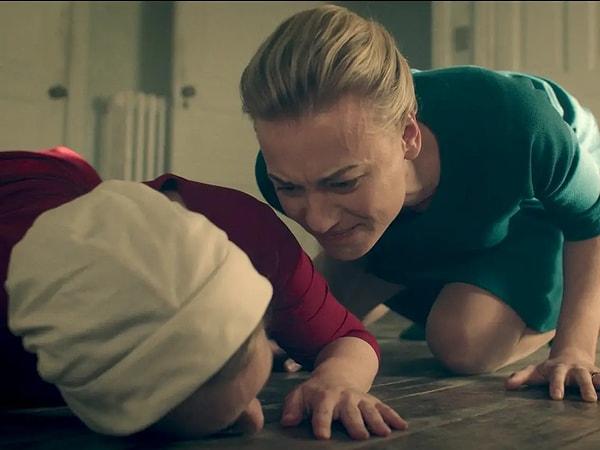
Courtesy of Hulu
The Human in Her
Margaret Atwood's original novel is about a young woman referred to only by her patronymic, Offred. Her identity--her name, her family, and everything about her former life had been erased, eclipsed by the dread force that was Gilead. Eventually, she would leave the household where she lived, and a new Offred would take her place. It would be like she never existed at all. The novel used this anonymity to create a narrative that, while it was centered around her, was also about the experience of countless other women who had found themselves in the same circumstances. We learned about the life of a typical handmaid, the households where they lived, and the struggles they went through. The TV series changed all of that. June declared her name in the first episode and announced that this was her story.
The show's creators followed that template ever since. We did learn about Gilead and everything else found in the novel, but it was through the lens of June's perspective and how she saw the world. They were constantly looking for ways to deepen our relationship with her. They developed a silent language made up of facial expressions and the pauses between each word. We became adept at reading her thoughts, even when they weren't spoken aloud, and we listened to detailed monologues about what it felt like to wear her cloak and wings. This technique was extraordinarily effective. We felt June's pain, every single second of it, and we identified with her.
Gilead became a sensation--a vice grip, tightening, testing June's ability to cope. We saw her tense up and tremble, crushed physically by the weight of her newly formed world. We felt Lydia's bombastic influence--like heated waves of aggression--Serena's frigid tone, and Fred's predatory stare. It was as if we were in her mind, living what she lived, and it was overwhelming.
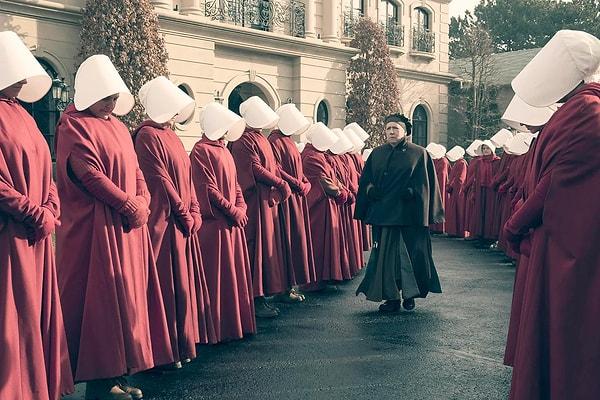
Courtesy of Hulu
More Than Just a Victim
June had become a victim. She was human, imperfect, and defiant. We cared about her. We sympathized with her, but sympathy isn't love. We can only feel sorry for someone for so long before they have to prove themselves to be something more, or we'll just look away. This did begin to happen. In a recent interview, Bradley Whitford, who plays Commander Lawrence, talked about how television shows integrate audience feedback into the writing process. During the second season, many audience members and critics spoke up about what was being called 'torture porn.' We would see June and the other girls being demeaned, violated, and beaten over and over again, and there didn't seem to be any point in it.
But as that was happening, June was beginning to blossom. She was too big, too vibrant, and too smart for her prison. She tested the confines, learning to slip in the wrong thing at the perfect time, allowing the others to become acclimated to her voice. She spoke up about Janine when she was worried about her being transferred from the Putnam's. She'd butter Fred up and stroke his ego, eventually earning the right to speak freely in his office. She rarely lied, and often when she did she pandered--not to Gilead, but to the people in power--offering them the kind, reassuring tone they needed to feel in control. This, combined with her sensibility and her ability to lead others, allowed her to build a rapport with both believers and unbelievers.
By the time she left the Waterford household, she had a true friend in Rita, Nick's love, and Fred's affection. Serena respected her and turned to her when she needed advice. She was never just a victim. She was regaining her voice and asserting her true self, which in many ways was the antithesis to Gilead and the control it held over their lives. She wasn't a waning spirit or a strip of flesh to be used. She was weighed down, constantly tested, and dominated, and she learned to adapt--a feat most could never accomplish. It was like Rita said, Gilead brought out the best in her.

Courtesy of Hulu
By Her Hand
The dystopian genre was never meant to go beyond the first installment. It began with short stories, quick novels, and maybe a radio performance or a film--never a full-length book series. When it did appear on television, it was usually part of an anthology like 'Outer Limits' or the 'Twilight Zone.' Audiences can't handle much else. The genre's tropes--death camps, brainwashing, and totalitarian control--were simply too depressing to withstand for long periods of time. Writers would compensate for this effect by creating sequels that focused on revolution. That came up quite a bit with 'The Handmaid's Tale.' Many said--as they often do--that they would abandon the show if the second season didn't have an escape or an uprising. But this is not a franchise that concerns itself with fantasy and myths. Atwood and the series' creators wanted to scare people, show them what was possible, and give them a vision of the real world gone wrong.
They were never going to give us the luxury of seeing June overthrow Gilead. Instead, they showed us a different kind of triumph: the triumph of the heart. It began with Serena, starting with the first episode. Serena has often been called a fallen woman. In the novel, she was a TBN choir singer, someone you'd overlook if you weren't a part of that world. But if church was your life, and you couldn't help but fill your home with the sound of praise and worship, then you knew exactly who she was.
Offred remembered flipping past her as a girl, trying to find something to watch on TV. She had a beautiful voice, tailored after years of hymns and worship tracks, and she was quite the celebrity--one of the powerful few, capable of pulling in millions for televangelists. When the fertility crisis began, Serena would speak at luncheons and conferences. She was a stylish Phyllis Schafly who preached about a woman's place in the home, wearing business suits and golden curls, but she never seemed to be in the home. She was always traveling, lecturing, and moving through powerful circles. She was an elevated symbol preaching sexism in a pretty package.
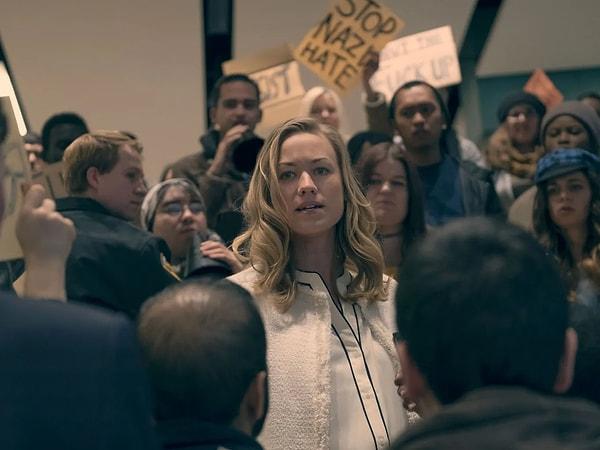
Courtesy of Hulu
Children have a sense of wonder, an innocent lack of knowledge, and a natural curiosity that allows them to believe in fantasies, just like Santa Claus. Unless those fantasies are shattered during childhood, they carry over into adult life, and they're very difficult to break away from. It's safe to say, since we were able to meet her mother Pamela, that Serena was raised in a Christian home where misogyny and extremism were the law of the land. She didn't see past her beliefs for many years.
It began slowly. Like June, she was a frog in a pot of boiling water. She didn't realize she was being threatened until it was too late, and her beliefs kept her from fully understanding what was going on. The mind has a way of reinforcing falsehoods, especially those backed up by emotion, repetitive doctrine, and one's personal sense of identity. When Serena was abused, and she saw women across the country being forced into slavery, she reverted back to her upbringing. Every Sunday, she was told that her special brand of Christianity was the source of all goodness and light in the world. How could she turn away from that?
But there were things that she valued--her writing, her career, and her influence--and she wasn't happy about giving them up. She tried to assert herself from the shadows, playing off of Fred's incompetence and insecurity. She'd sign his name, help him with his paperwork, and try to make decisions for him. It worked because Fred was aware that she was smarter and more capable than he was. But as Gilead's philosophy began cementing itself, and men began to set themselves above women, she started to lose his support. He'd refuse to talk business at the table. He'd reassure her that everything was fine, and eventually, he would shut her out of her office and completely exclude her from leadership.

Courtesy of Hulu
Yvonne Strahovski, who plays Serena, has spoken before about Serena's narcissistic bubble. Like many intelligent individuals, she was extremely shortsighted. She could influence people, lead, and create compelling propaganda, but when it came to her own circumstances, she was completely blind. She thought she was special, that Fred would always support her, and that those around her would always consider her the exception to their misogynistic beliefs. But she was wrong, and June saw that immediately.
In the first episode, they introduced us to Gilead, its propaganda sessions, and the death of the time before. It was a hellish transformation, but many viewers didn't feel it--not until June got back from her first shopping trip and she spied Fred close his office door, blocking Serena from entering. When she realized that June was watching, she told her to go back to her room, kicking off a chilling soundtrack that followed June all the way back to her upstairs prison.
Women had lost their place, and both of them were examples of oppression--wife and handmaid. Even at the highest levels of society, they were inferior. The crushing nature of that revelation and the impact of it was a thousand times worse than Lydia's cattle prod and the troops in their streets because it represented a fundamental shift--something so wide-reaching and so overwhelming that it dominated an entire sex, forcing them to be treated like children. But Serena barely understood what was happening at that point.

Courtesy of Hulu
Unlike the show's believers, June saw everything clearly. Knowledge in Gilead seemed to travel from the bottom up. The marthas, handmaids, and unwomen were privy to the regime's secrets. They were the starved, the suffering, and the oppressed, and they understood exactly what had happened to them. Most would never spoke up, and they'd be punished if they were. A handmaid in the Putnam or Calhoun household would probably face a beating or disfigurement if she complained about her own circumstances, But June didn't have those same constraints. She was cunning and sensible, and she had learned how to speak.
She didn't seem to care about the consequences of doing so either, and sometimes she didn't have to say anything at all. With a look, she spoke volumes. When Serena first allowed her to visit the Putnam's, after Janine gave birth to Angela, June heard that Janine had bitten Naomi. So she snuck into Janine's room to speak with her. It became obvious that Janine was losing touch, and she told Serena that.
Serena was smart enough to recognize the effect of the ceremony and what the handmaids went through. She knew that there were some girls who had been driven into a psychotic state--as is often the case with brainwashing and oppression--and she said so. June wasn't about to let her get away with that. She stared her down, clenched her fists, and pursed her lips, ready to sob. She was confronting Serena silently, and while it did nothing to change Serena's attitude toward June's enslavement, something had occurred between them.was like June had planted a seed.

Courtesy of Hulu
June was not very good at interacting with Serena. She resented her deeply. Early on in the series, they had a false alarm. June's period was late, and Serena got her hopes up. When June confessed that she was menstruating, Serena grabbed her, forced her into her room, and completely lost it. That was the origin of the iconic phrase, 'Do you understand me?'
June's confinement had a profound effect on her mental health. She had an enormous amount of pride, and that was very important to her character. But at some point, she couldn't help it. She was so humbled, she had to beg for release. Serena demeaned her this way, not Fred. She treated June like a prisoner. She beat her, berated her, and she made her feel like she was nothing more than a pet. But eventually, her appreciation of June's pregnancy led them to bond.
They had a shallow connection. Serena saw June as a vessel, not a person, but June was granting her the one thing she thought would make her like complete. June was able to use that, build on what was happening between them, and try to assert herself. In season 2, Janine found out that baby Angela was sick, and she was losing her mind over it. Everyone believed that Janine was fragile, mostly because of her delusions, so June asked Serena to let Janine come visit Angela. Serena immediately denied the request, so June leveraged Janine's mental health, saying that it might be Janine's last chance.
It was a way of pulling on Serena's heartstrings, giving her a choice between allowing a fragile young woman to fall into madness--a state she may never overcome--or letting her have a chance at life. Had Serena said no, Janine would've likely done something that would lead to her execution. June had shone a light on Serena's decency, and it worked. Serena made the request, and Angela was healed by Janine's presence.
June had also shown a light on a larger existential issue within Gilead, one that most believers had become blinded to. Children recognize their mothers, their smell, and their touch, and there are times when their absence can be distressing. Separating handmaids from their children was an unnatural act. They saw what Janine had done, and they also saw that June orchestrated it. There was no denying the beauty of what had happened, especially in a culture focused on the birthrate.
But June had already gained Serena's respect at that point. They had been working together in Fred's office, performing his duties, while he recovered in the hospital from the red center bombing. Serena saw that June was a competent editor, and she valued her skills. This was the first time June was really able to slip something meaningful into their conversations. She asked Serena if she missed working, and though Serena wasn't able to admit it, it got right down to the heart of her grief.
It was a bonding moment between them, but they didn't really build a connection until Fred came home, and he announced that Serena's time in his office was over. What he did next shattered Serena's perception. It forced her to question the nature of her marriage, and it gave her no choice but to finally accept the nature of Gilead's philosophy. Fred beat her in front of June, framing it like a father punishing his child, and it had Serena so humbled she was sobbing. She went upstairs, took off her clothes, and lost herself in her tears, revealing a map of bruises.
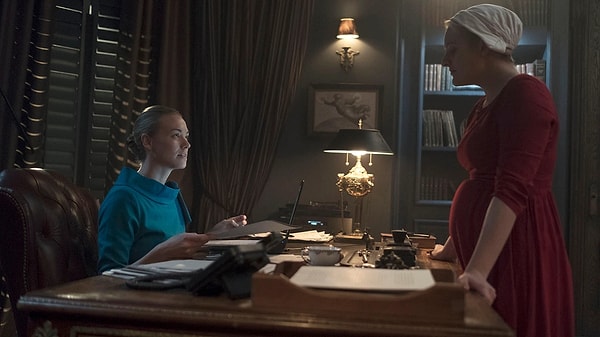
Courtesy of Hulu
June cuts deep, down into the vulnerable places, illuminating the issues that can't be covered up by extremism or self-delusion. That is what she did with Serena. She came right up to her bedroom door and asked her if there was anything she could do. She was saying so much more than that, of course. She was telling Serena to look, see what he did, what this world has become--what they have done to us as women--and she was offering her solace. The door between them became a symbol. It was a wall that June couldn't cross.
Serena wasn't going to let her suffering show, and she wasn't going to fully acknowledge it. But the incident stuck. There was no turning away, no hiding. She was a member of a discriminated class now, and she had none of the power she needed--no independence, no strength. She was weak, and Serena cannot abide weakness, not when it stemmed from oppression.
Things were up and down after that. Serena was insecure. She didn't have much control over her life, and she needed to cling to whatever she could. She saw that June was moving around the house, saying and doing what she wanted. She wanted to draw a line in the sand and put June back in her place. Ultimately, she had Fred violate her under the pretense of making Nichole come sooner, and for many, it was one of the most traumatic scenes in the entire series. But June was sensible. She was intelligent, and in many ways, she was their better. She saw things more clearly than the Waterfords, and she didn't have any of the emotional issues or petty turmoil that ruled their marriage. They did see that. Perhaps it's what allowed June the freedom to walk into Serena's greenhouse after Nichole was born.

Courtesy of Hulu
Eden had just been killed for falling in love--as teenagers often do--and Serena had taken control of Nichole, a deeply unsettling experience for June. It's not spoken about much, but as a parent, June must've felt profoundly disturbed by the idea of Gilead raising her daughters. Not only would they be brainwashed, but Gilead's justice system could come for anyone at any time--especially if they were willing to kill someone as pious and devoted as poor Eden.
She found a Bible hidden in Eden's things, an egregious crime as far as Gilead was concerned. They would've preferred erotica to the living proof that they were twisting scripture. When June brought it to Serena, she declared that their daughter would never be allowed to read God's word. It cut deep enough that Serena was actually willing to take her concerns to the other wives. We learned, through Serena's conversation with Naomi, that Serena was concerned about the way that women were being treated. This was something she never voiced. She had a careful way of saying things, which Naomi mirrored, all in the context of loving Gilead. It was like seeing two dissidents speak in code.
June had done the impossible. Serena was the quintessential ice queen, cold in every way. She couldn't say the truth aloud, and she actively lied to herself. Melting a heart like that took time, and a veritable jackhammer, pounding away at years of indoctrination, delusion, and myth. But June kept trying and kept pushing her. Whenever they got close enough, she was always slipping things in, appealing to Serena's empathy, her independence, and eventually her suffering. It paid off. Serena organized the other wives, and they decided to confront their husbands in a council meeting, where she read from Eden's Bible.
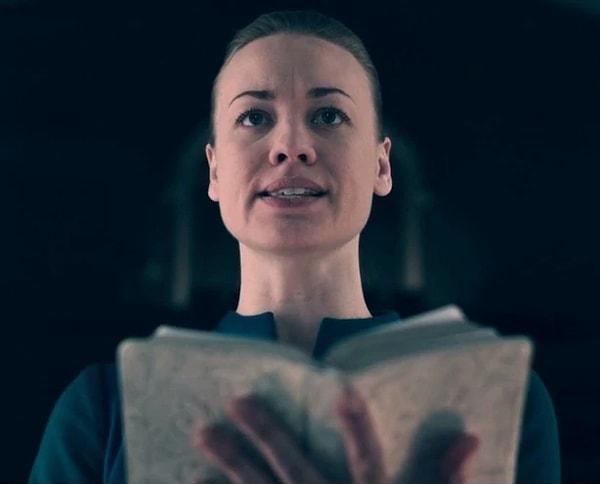
Courtesy of Hulu
It was a heartfelt, inspiring act, but it wasn't courageous. It was naive. Serena always believed that she was special. She was an author and the architect of the nation's philosophy. She took great comfort in her status as the wife of a founding father. She would say that the Waterford name held weight. What she didn't understand was that her status as his wife was a shackle around her ankle. She would never be allowed to leave. Each wife had duties and expectations. She was a prisoner and a slave, not a valued member of society. She didn't think that she would be punished for reading. She thought that Fred, at least, would shield her, and he didn't.
Fred had her dragged through the halls of the government building, screaming, begging him to help her. In truth, he probably agreed to allow her to amputate her finger, partially because he didn't want to look bad, but also because he didn't approve of Serena reading. That was so wild, so barbaric and brutal, it broke Serena.
That was when June came, ready to shine a spotlight on what had happened, and Serena allowed her to enter their room, symbolizing that she was ready to accept June's message--one that June had been reiterating over and over in as many ways as she could: Gilead was evil. Their country was dead, and what was happening to women was wrong. That was how Serena was able to find it within herself to give up the one thing that she wanted more than anything else in the world--her drive for living, her reason for getting up every day, putting on the teal, and playing the part: Nichole. That was because of June. She was leading Serena. She inspired her to follow that path, and when it came time, it was June that brought her back to reality saying, 'You know she can't grow up here.' Serena listened to her. She trusted her. She knew that June had tapped into a truth that she had never allowed herself to see before.

Courtesy of Hulu
Enlightenment
We knew that June was able to guide Serena, show her the way, and inspire her to do the right thing. But it seemed like a matter of circumstance. June didn't cut off her finger. She didn't beat her the way Fred did. June wasn't the one that set off the bomb that put Fred into the hospital, leaving the house filled with women struggling for independence, and she wasn't the one that caused the two women to begin bonding. That was her pregnancy.
June was still dominated by powers outside her control. She didn't have anyone who could help her escape or find her daughter, and she had chosen to stay inside Gilead. When Serena burnt the Waterford house down, and it came time for June to find another posting, Commander Lawrence stepped onstage, and we saw potential. He was the architect of Gilead's economy, powerful and seemingly sympathetic. Maybe he could make it happen. He had already brought June to the MacKenzie's house to get Hannah back. She might be able to convince him to do something.
But Lawrence is a complicated man, difficult to read, and even harder to sum up. His personality is nuanced. Normally in fiction, a character has a basic motivation, based either on an agenda or their backstory. But Lawrence was already so conflicted by the time we met him, it was hard to make sense of him or his behavior. He also had a way of keeping people out of his head.

Courtesy of Hulu
Lawrence lived a cloistered existence, very private, always shuttered from the rest of Gilead. He didn't want anyone seeing his wife, Eleanor. It would be impossible to diagnose her, but she held delusions, and she seemed to have issues with her mood. She would've destroyed Lawrence's reputation with the other commanders, and they were so strict about everything that it was likely she would say or do something that would get her killed. So he shut her up in her room, swore everyone in the house to secrecy, and stayed close.
Eleanor was a living reminder of his crimes, throwing them in his face, telling him over and over what he had done. She was deeply disturbed by the colonies--death camps, where women would have to shovel radioactive dirt. She told Lawrence that those were real people, real victims, and they were going to die. Lawrence didn't want to be reminded. He stayed home. He stuck with his hippie music, drank fine scotch, and let everyone else come to him or bring him what he needed. The world itself was too much for him.
This entire state of being was completely obtuse and never explained. It was revealed in little quips, nothing that the viewer could use to see the full picture. But June got it. Lawrence was a socio-political economist who had come to the conclusion that human rights were destroying American institutions. He believed that they were keeping humanity from solving the fertility crisis and global warming. He saw that religion was a potent tool for controlling the masses, and it is--one of the most powerful. So he joined the Sons of Jacob, but he wasn't religious. He crunched numbers. He wrote books and studies, and that led him to believe Gilead would be effective. He just didn't realize what it would look like when those horrors played out, and he didn't fully understand the power of extremism. Rather than face that, he buried himself in his paperwork--avoiding the bodies on the wall, the executions, and prayvaganzas. He couldn't stand to see those things. That was one of his deeply held secrets. He wasn't the type of man to reveal his vulnerabilities.
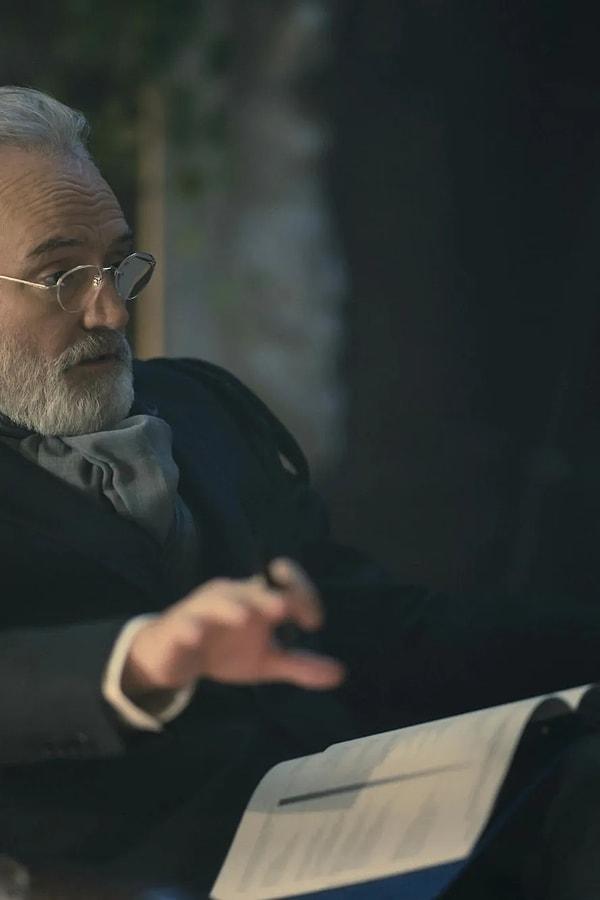
Courtesy of Hulu
June has a nose for insecurity. She sees people for who they are, and she saw exactly what Lawrence was doing. She stormed into his office, and she rubbed his nose in it so thoroughly that it changed him. He even spoke about that with Nick in season 4. She said that it must be horrific realizing that all of the numbers in his files were real people, that he was playing with real lives.
Lawrence played it off so effortlessly that it would've been impossible for the audience to realize that she was getting to him, but she was. He said that it must be easy to invent a humanity in someone, even when it wasn't there. He actually tried to make a point to her, taking the unconventional step of showing her the pens--cages meant for cattle, where they kept women who were waiting to be moved. Lawrence and the other commanders spent much of their time relegating those women to specific roles, supplying marthas, handmaids, and unwomen where they were needed. June was so sickened by it that when he offered to let her choose a handful of women to save, she said no.
She realized that his biggest weakness was his wife. He couldn't hide that, and he knew it. She told him that the world he had created was killing her. It didn't take much for him to agree to send her to Canada with June. When that didn't work, she had him inviting dozens of children into his home, reading a story to them before they brought them on foot to the airport.
Woman's Work
Gilead turned brainwashing into a science. They exploited the innermost parts of our being, using fear, the survival instinct, isolation, and violence to break its citizens down, until there was nothing left. This created a blank slate, which they could then fill in with lies, sayings, and false beliefs. June was the eraser, storming in, destroying all of the demented logic and restrictions that Gilead imposed on its people. She'd scoff, shake her head and start speaking the truth, and she knew how to inspire others. She told Moira to get her shit together, inspiring her to escape Gilead. She shocked Nick out of his happy existence as Fred's driver. She even got to Lydia, the most indoctrinated character in the show. It was amazing to see.
Lydia was a skilled propagandist. Many of her techniques come from the Cold War and authoritarian governments in East Asia, where they would gather people around and spend hours every day shaming them for their beliefs. That is how the series developed Lydia's blame circles, where she would have everyone sit in a circle and tell the person in the center that it was her fault. June used that against Lydia. She told her that she reassured the girls that they would be OK, so long as they wore their cloak and wings and followed the rules, but that's not what happened. Lydia sent them out into the world to be beaten and violated over and over again, and it was her fault. Those two words 'your fault' had Lydia pacing around, unable to cope with what she had just heard. It defined her struggle going forward, because June knew that Lydia hated the abuse the girls were facing. Like all extremists, Lydia believed in doing what was right.
June had become the antithesis to Gilead's indoctrination, a force that Gilead could not reckon with. The regime relied on their lies, and June could counter them. But that wasn't enough. They were strong enough to hurt June. They could do anything--send her to the colonies, force her to shovel up radioactive dirt, hurt Hannah, or put her on the wall. June did come close to getting Hannah. She was able to convince Lawrence to get her out so she could take Eleanor with her. She even found Hannah's martha, Frances, who was willing to take Hannah from the MacKenzies.
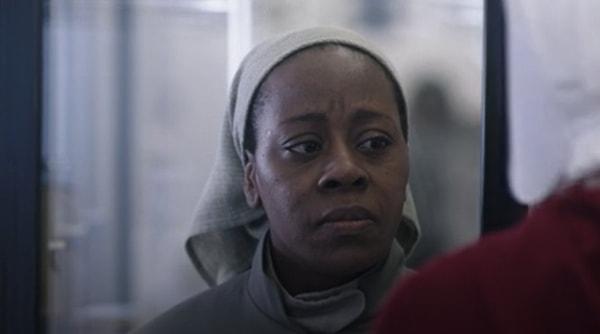
Courtesy of Hulu
When June's shopping partner Natalie found out what happened, she went to Aunt Lydia, who decided to have Frances executed for endangering a child. Natalie bragged about it when they walked away from the gallows, and June lost control. She kept screaming, 'Do you know what you've done?' Natalie knew she got someone executed, but she didn't process it. June and the other handmaids went about the task of fixing that. They bullied her until she was reduced to a crying mess, and then June had her put in the middle of a blame circle, where they forced her to confront her feelings about her pregnancy, which June knew to be her greatest weakness. This was the one time we saw June use her powers to do something terrible.
It drove Natalie insane. When they were shopping, she grabbed a can of fish, sobbing and cradling it, silently begging to be forgiven, until she couldn't stand it anymore, and she bashed Janine in the head with it. When a guardian tried to stop her, she slammed him in the neck with a mason jar. It broke and the glass stabbed him in the artery. She reached down, grabbed his gun and nearly shot Aunt Lydia. Before she could, the other guardians filled her with bullets.
Natalie was forced onto life support, kept alive in a perpetual state of pain, so her unborn fetus could gestate before they pulled the plug. Lydia handed June a cushion and told her to kneel in front of her bed and pray until the baby came. June spent weeks there, driven mad by the guilt and isolation. It was one of the most difficult episodes in the series, and it's likely that many people refuse to rewatch it because it was centered around June's degrading state. We saw her trembling, her pupils pinned, with circles forming around her eyes. She had this chilling, manic tone in her voice that made it impossible to deny that something was seriously wrong. A doctor told her that she would be facing brain damage because of it. Fiction doesn't usually go to these places. It's too ugly. It kills the type of love the audience develops for the characters. She wasn't sane any longer, and she never would be. She developed into someone else--beautiful, but damaged. The audience still struggles with their feelings towards her after what happened.
In the next episode, June came hobbling out of the red van, barely able to walk after kneeling so long and announced to Aunt Lydia that she had found her calling. Her head was held high, and she was so determined in her stature that it was almost fun to see, until she started talking about what she planned on doing. If she couldn't get to Hannah, she was going to deal a mortal blow to Gilead and come for their children. She'd bring as many as she could to the Lawrence house and smuggle them out of the country. It was suicide, and after seeing her unravel the way she did, it was difficult to imagine her idea succeeding. But something had happened to her that we didn't quite understand.
Over time, people tend to self-impose the restrictions that have been placed upon them. A good example would be a baby elephant. They can be kept on a leash with a simple stake in the ground because they're young. They will tug and tug on that stake, but they won't be able to move it. Eventually, they'll stop tugging, and they'll never try again, even when they get bigger. So when they're full-grown adults, they can be held in place with that same tiny stake. They'll be convinced that it's impossible to move it. Gilead worked the same way. People were so broken by the regime that they had stopped tugging, and they didn't realize what they were capable of.
It was a mental prison, imposed by a culture of fear, and June's experience in the hospital allowed her to liberate herself from it. She was no longer quiet and sweet. She didn't pander to anyone. She did what she wanted to do, and she inspired others to do the same. When word got out about Angel's Flight, chaos erupted across the country. It resulted in mass rebellion. At a Jezebels in season 4, one of the girls told her that people were doing things, blowing things up, cutting wires, and acting out. June was able to inspire her to give up her life and poison more than a dozen commanders who were on their way to fight in the war. It worked. She became a symbol of anarchy and resistance. That's why she was treated as a high-profile refugee, and it's why she's become a target. She might not have been capable of overthrowing the nation, and that spirit of chaos may not last, but she learned to use her unique abilities and her mental state to fight in a meaningful way.
St. June
It can be difficult to relate to a protagonist when they're shivering and obsessing over murder. It's even harder when they start talking about how much they enjoyed tearing a human being apart with their bare hands. When Luke and Moira realized what June had done to Fred, they questioned her. Members of the audience walked away, unable to support an unraveling heroine who committed an unspeakable act.
'The Handmaid's Tale' has a way of getting us caught in the moment, focused on Fred's pleas or Serena's grief over his death. They do that because it allows them to control our reaction to certain scenes, but it makes it harder for us to remember the bigger picture.
June killed a founding father of a nation that enacted the worst holocaust in human history. Fred had more blood on his hands than any man that ever lived, and he was addicted to hurting women. Had she not killed him, Gilead could have let him go free, and he would've gone back to violating innocent girls.
If the situation had been framed differently, we would've cheered a slave on for killing her former master, and we would've felt justified in doing so. Many audience members wouldn't admit that, but it's true. There are plenty of films and TV shows that turn a murder into a good thing. We see it all the time, and we don't react this way to it.
June is not a monster. We should love her for those flaws, and recognize her inner strength. Many people in her circumstances would've ended up in a padded cell from the trauma. Let's remember who she is: public enemy number one. She had conquered Gilead within herself, and she became everything they hated. She was a loud, powerful woman who spoke her mind and refused to stay quiet. We should also remember the people that she influenced: the architect of Gilead's slave economy, Gilead's philosophical founder, and Aunt Lydia--whose righteous anger could move mountains. Lydia would not have started down her current path had it not been for June. That's no small task. June is a saint, the patroness of freedom, a symbol for the oppressed, and an extraordinary figure capable of countering Gilead's brainwashing.
Keşfet ile ziyaret ettiğin tüm kategorileri tek akışta gör!

Send Comment